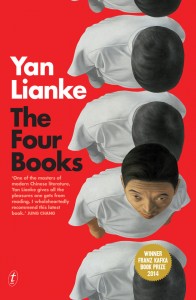THE FOUR BOOKS
Yan Lianke (Text, 2015) ISBN: 9781922184487, RRP AU$29.99 
It’s been a while since I read a book that left me with the single thought, “what the fuck?” Strange as it might sound, I don’t mean this in a negative way. It’s good when a book provokes thought about what just happened and what it all means — to an extent. The Four Books is one such book. Set in a re-educational camp along the banks of the Yellow River during China’s Cultural Revolution, it certainly inspires the questions, “what did I just read? What did the author want me to get from this?” in ways that benefit it. I like the book more now than I did when I finished it, simply by virtue of having given it some consideration.
The Four Books is described as a satire. It follows the activities of a group of intellectuals sent to a re-education camp led by The Child, a young and fervent true believer. He is eager to re-educate the criminals in his charge, and to show his own loyalty to the “higher ups”, which will enable him to receive coveted awards such as visits to the regional and national party headquarters. Thus he engages in reformative activities with vigour, hunting down forbidden books and having the Author keep secret notes about the behaviour of his fellow inmates. He fully embraces the dictates of the higher ups to grow impossible amounts of grain and smelt impossible amounts of steel, using any means necessary. He does, fortunately, use the carrot as opposed to the stick. He rewards his inmates with red stars, and if they collect a sufficient number, they are assured they will be allowed return home.
The book is written as a collection of three different works interspersed in what appears to be chronological order, Heaven’s Child, which describes in a fairytale-like manner The Child as he receives his orders and tries to prove his loyalty by exceeding them; The Author’s Criminal Records, in which he tells The Child of the goings on within the re-education facility; and Old Course, The Author’s candid memoir of his time in re-education. While there are stylistic differences between the sections, I had difficulty differentiating them and quickly started to ignore the division as anything other than a chapter break.
Life in re-education is defined by a series of ludicrous claims. For instance, because re-education is made up of intellectuals, its inmates must surely be able to produce far more grain than peasants with the same amount of land, and far more steel than peasants produce each week. The land around the Yellow River, however, is poor and contains little to sustain plants, or to smelt in the way of steel. So the inmates pioneer a method of deriving tiny amounts of iron and other minerals from the sands of the Yellow River. The method is quickly adopted across China. Spurred by the need to be released from re-education faster, The Author produces a field of wheat by watering it with his own blood. Fearing that this method, too, will be spread across China, The Scholar destroys the wheat. Because of the focus on steel production, the countryside is left bare and unprotected; environmental disaster and a famine ensues. The criminals soon find themselves abandoned by the higher ups to their fate, whether it is to starve or to survive.
It appears many reviewers have taken all this to be a commentary on China’s present industrialisation and the human costs thereof. This is entirely possible, especially when one considers the field literally sewn with blood. However, I was surprised by how very little The Four Books actually exaggerates the circumstances and consequences of the extraordinary crop failure leading to the Great Famine. The book is a commentary on China’s approach to its own history as well — on the Party’s refusal to acknowledge the reality it is presented with and forging ahead (literally) in willful ignorance, with disastrous results. Belief in the Party and the revolution provides inspiration, but it does not nourish the criminals as they descend into starvation and death. The higher ups withdraw when they are most relied upon in their efforts to pretend nothing is all that wrong. They deny the extent of the famine and ban travel or communication to prevent the news crossing village borders.
I can imagine this book being embraced in literary circles and becoming a modern classic of literary satire, along the lines of Kafka’s works, Kundera’s The Unbearable Lightness of Being and Rushdie’s Satanic Verses. Its status as a book “banned in China” is promoted by the publisher, though the introduction clarifies that most Chinese authors have works censored or banned. It is a difficult read, but one which stimulates thought. The ending, especially, I am still trying to work out. The Four Books is definitely not for everyone, but will be interesting for those who appreciate the genre.

